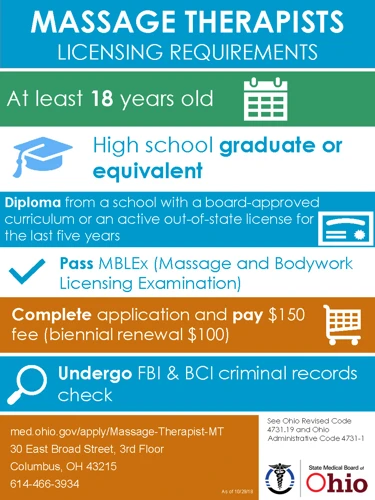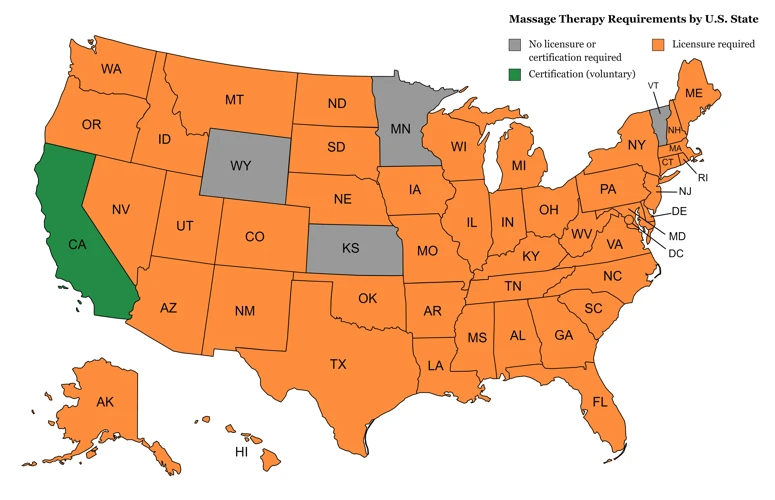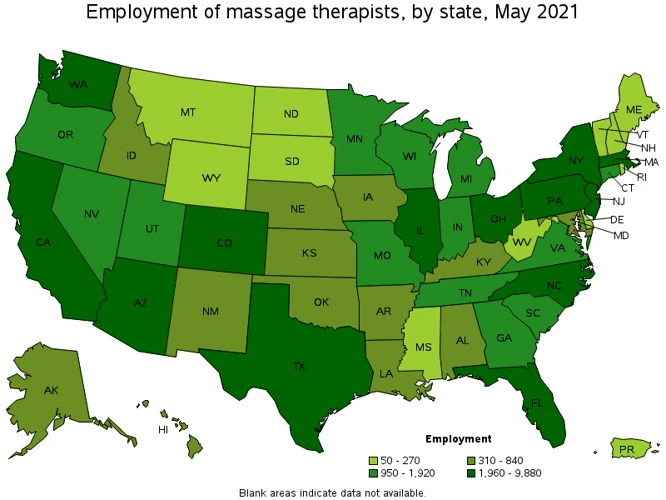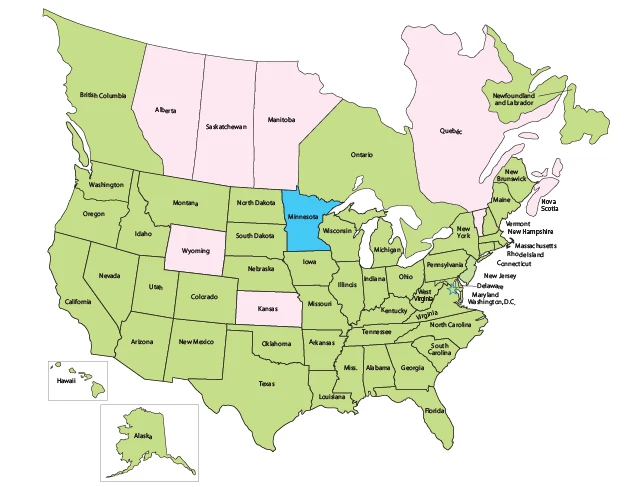Do you want to become a massage therapist but are unsure of the licensing requirements? It can be confusing to know what states do not require a license for massage therapy. This article will provide you with an overview of which states are exempt from licensing requirements for massage therapy. We will discuss the various regulations that each state has in place, as well as provide resources to help you find out more information. Additionally, we will provide guidance on how to ensure that you are compliant with the licensing requirements of your state. By the end of this article, you should have a better understanding of what states do not require a license for massage therapy.
Contents
Overview of Massage Therapy Licensing Requirements

In the United States, massage therapists must be licensed in order to practice massage therapy. There are a few exceptions, however, and some states do not require massage therapists to be licensed. The licensing process varies by state, but typically requires a certain number of hours of massage therapy training, a written examination and a criminal background check.
In addition, some states require massage therapists to complete continuing education in order to maintain their license. Depending on the state, massage therapists may also need to obtain liability insurance or be affiliated with a professional organization before they can practice massage therapy.
The states that do not require massage therapists to be licensed are Alaska, Kansas, Minnesota, Montana, New Hampshire, Oklahoma, Rhode Island and Wyoming. In these states, massage therapists may need to register with the state in order to practice massage therapy. However, they do not need to complete the licensing process required in other states.
In addition, some states allow massage therapists to practice without a license if they are under the direct supervision of a licensed health care provider. In these states, massage therapists may provide massage therapy services to their clients while working in a healthcare setting, such as a hospital or clinic.
Massage therapy licensing requirements vary by state, so it is important to check the rules and regulations in your state before beginning your massage therapy practice.
What States Do Not Require a License for Massage Therapy

Alaska
Alaska does not require a massage therapy license for practitioners.
Arizona
Arizona requires massage practitioners to have a valid state license in order to practice.
Arkansas
Arkansas does not require a massage therapy license for practitioners.
Colorado
Colorado requires massage practitioners to have a valid state license in order to practice.
Connecticut
Connecticut does not require a massage therapy license for practitioners.
Delaware
Delaware does not require a massage therapy license for practitioners.
Hawaii
Hawaii does not require a massage therapy license for practitioners.
Idaho
Idaho does not require a massage therapy license for practitioners.
Kentucky
Kentucky does not require a massage therapy license for practitioners.
Louisiana
Louisiana does not require a massage therapy license for practitioners.
Maine
Maine requires massage practitioners to have a valid state license in order to practice.
Michigan
Michigan does not require a massage therapy license for practitioners.
Mississippi
Mississippi does not require a massage therapy license for practitioners.
Montana
Montana does not require a massage therapy license for practitioners.
Nevada
Nevada requires massage practitioners to have a valid state license in order to practice.
New Hampshire
New Hampshire does not require a massage therapy license for practitioners.
New Mexico
New Mexico does not require a massage therapy license for practitioners.
North Dakota
North Dakota does not require a massage therapy license for practitioners.
Ohio
Ohio does not require a massage therapy license for practitioners.
Oklahoma
Oklahoma does not require a massage therapy license for practitioners.
Oregon
Oregon does not require a massage therapy license for practitioners.
Rhode Island
Rhode Island does not require a massage therapy license for practitioners.
South Dakota
South Dakota does not require a massage therapy license for practitioners.
Tennessee
Tennessee does not require a massage therapy license for practitioners.
Texas
Texas requires massage practitioners to have a valid state license in order to practice.
Utah
Utah does not require a massage therapy license for practitioners.
Vermont
Vermont does not require a massage therapy license for practitioners.
Virginia
Virginia does not require a massage therapy license for practitioners.
Washington
Washington requires massage practitioners to have a valid state license in order to practice.
West Virginia
West Virginia requires massage practitioners to have a valid state license in order to practice.
Wisconsin
Wisconsin does not require a massage therapy license for practitioners.
Wyoming
Wyoming does not require a massage therapy license for practitioners.
The states listed above do not require a massage therapy license for practitioners. However, if you are looking to practice massage therapy in a state not listed, you should check with your local government to find out if a license is required.
What States Do Not Require Massage Therapists to be Licensed

Alabama
Alabama does not require massage therapists to be licensed.
Georgia
Georgia does not require massage therapists to be licensed, though massage therapists must register with the Georgia Board of Massage Therapy.
Iowa
Iowa does not require massage therapists to be licensed.
Kansas
Kansas does not require massage therapists to be licensed.
Massachusetts
Massachusetts does not require massage therapists to be licensed.
Missouri
Missouri does not require massage therapists to be licensed.
Nebraska
Nebraska does not require massage therapists to be licensed.
New Jersey
New Jersey does not require massage therapists to be licensed.
New York
New York does not require massage therapists to be licensed.
North Carolina
North Carolina does not require massage therapists to be licensed.
Pennsylvania
Pennsylvania does not require massage therapists to be licensed.
South Carolina
South Carolina does not require massage therapists to be licensed.
What States Require a Massage Therapy License
California
California requires massage therapists to be licensed by the California Massage Therapy Council (CAMTC). This license is issued after passing the National Certification Board of Therapeutic Massage & Bodywork (NCBTMB) exams, and the CAMTC has additional requirements for licensure.
Florida
Florida requires massage therapists to be licensed by the Florida Board of Massage Therapy. To be eligible for licensure, candidates must complete an approved massage program, pass the MBLEx exam and submit an application to the board.
Illinois
Illinois requires massage therapists to be licensed by the Illinois Department of Financial and Professional Regulation. To obtain licensure, applicants must complete an approved massage program, pass the MBLEx exam, and submit an application to the department.
Indiana
Indiana requires massage therapists to be licensed by the Indiana Professional Licensing Agency. To meet the requirements for licensure, applicants must complete an approved massage program, pass the MBLEx exam, and submit an application to the agency.
Maryland
Maryland requires massage therapists to be licensed by the Maryland Board of Massage & Bodywork. To be eligible for licensure, applicants must complete an approved massage program, pass the MBLEx exam, and submit an application to the board.
Minnesota
Minnesota requires massage therapists to be licensed by the Minnesota Board of Massage Therapy. To obtain licensure, applicants must complete an approved massage program, pass the MBLEx exam and submit an application to the board.
Nevada
Nevada requires massage therapists to be licensed by the Nevada State Board of Massage Therapists. To be eligible for licensure, applicants must complete an approved massage program, pass the MBLEx exam, and submit an application to the board.
Frequently Asked Questions
What Exactly is Massage Therapy?
Massage therapy is a form of hands-on manipulation of soft tissues, including the muscles, connective tissues, tendons, ligaments, and joints. It is used for therapeutic purposes such as reducing pain and stress, improving circulation, and increasing relaxation. Massage therapists typically use a combination of techniques, such as kneading, stroking, and tapping, to help their clients achieve the desired outcome.
How do I know if my state requires a license for massage therapy?
- Check your state’s massage therapy laws: Every state has laws regarding massage therapy. You can find out if your state requires a license and what type of license is required by checking your state’s laws.
- Contact your state’s massage therapy board: Every state has a massage therapy board that provides information on licensing and other regulations. Contact your state board for more information.
- Check the American Massage Therapy Association website: The American Massage Therapy Association (AMTA) website provides information about massage therapy licensing in each state. Check their website for more information.
Are There Any Other Requirements Besides Licensing When Practicing Massage Therapy?
Yes, besides licensing, there are a few other requirements that must be met in order to practice massage therapy. These include:
- Proof of completion of a massage therapy program approved by the relevant state board.
- Submission of the appropriate application and fee to the relevant state board.
- Submission of proof of good moral character.
- Submission of proof of liability insurance.
- In some states, passing an examination.
In addition, most states require massage therapists to maintain continuing education credits in order to renew their licenses.
Are Massage Therapists in Exempt States Regulated in Any Way?
Yes, massage therapists in states that are exempt from licensing requirements are still subject to certain regulations. These regulations may include:
- Background checks and fingerprinting
- Health and safety regulations
- Insurance requirements
- Client confidentiality
- Continuing education requirements
- Payment processing regulations
The regulations vary from state to state, so it is important to check with your local government to ensure that you are in compliance with all applicable laws and regulations.
Is There a National Organization That Sets Standards for Massage Therapists?
Yes. The National Certification Board for Therapeutic Massage & Bodywork (NCBTMB) is a non-profit, independent organization that sets standards for massage therapists across the United States. The NCBTMB provides a voluntary certification program to recognize practitioners who meet high standards of knowledge and competency in massage therapy.
- The NCBTMB sets standards for massage therapist education, practice, and professional ethics.
- It offers a voluntary certification program to qualified practitioners.
- It educates the public about the value and benefits of massage therapy.
- It monitors state and national regulations for the massage therapy profession.
- It provides an online directory of certified massage therapists.
The NCBTMB also works with state massage therapy boards to ensure that massage therapists are properly trained and licensed. The organization’s efforts have helped to establish uniform standards of practice and professional ethics across the United States.
Conclusion
Massage therapy is an important profession that requires proper licensing to ensure safety and effectiveness. While each state has its own licensing requirements, some states do not require massage therapists to be licensed. Those states are Connecticut, Kansas, South Dakota, and Wyoming. Other states may have limited licensing requirements such as certification or registration. It is important to research the licensing requirements of each state before starting a massage therapy practice.

